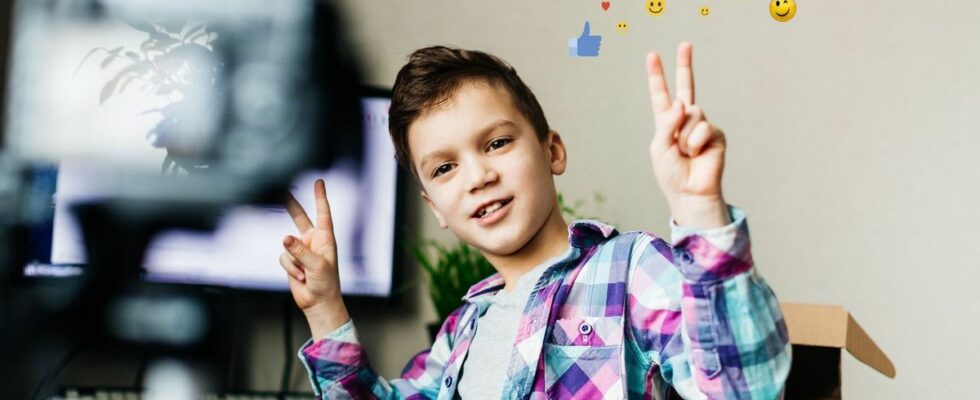Published on
updated on
Reading 3 min.
in collaboration with
Amélie Boukhobza (Clinical psychologist)
On the eve of the release of the event series “Children are kings”, freely inspired by the novel by Delphine de Vigan, the enslavement of children on social networks is more worrying than ever. But in real life, what should you say to a loved one who overexposes their children? Our psychologist’s response.
Perhaps you have already seen them in cheerful and colorful advertising spots, financed by brands like Nintendo, Sony Computers and McDonald’s. These child stars, who spend their days unwrapping sponsored gifts under the eye of the cameras, constitute the subject addressed (and denounced) by Delphine de Vigan in her book “Children are kings“. While the monetization of content and the excessive media coverage of intimacy are now commonplace, how can we educate a loved one who exposes their children online? We asked Amélie Boukhobza, clinical psychologist, the question.
Children are kings: a scathing critique of today’s voyeurism
In his bestselling novel “Children are kings“, Delphine de Vigan looks at a fascinating and worrying social phenomenon: the overexposure of children on social networks. A form of contemporary and tragic family reality TV, often motivated by the exploitation (paid and not consented) of children.
Through her work, adapted and broadcast in a Disney series this Wednesday, October 23, the author denounces the harms of social networks. Mélanie Diore, failed reality TV star and key character in the novel, projects her children Kimmy and Sammy onto the canvas, from morning to evening. Without warning, she appears, cell phone in hand and comments on the images, in the company of her husband, Bruno, reduced to the role of assistant. The machinery is well oiled and the filming continues, until the day when… their daughter is kidnapped. Clara Roussel, a young solitary police officer, then takes part in the investigation.
A story that could make you smile, if it weren’t deeply real. Swan and Néo, 10 and 16 years old, have nearly 6.72 million subscribers on their shared YouTube channel.
YouTuber Nastya, aged 9, is followed by 121 million subscribers. On the program of his videos: songs, decoration, cake recipes and moments of life.
As for Ryan Kaji, star of social networks since a young age (38 million subscribers on YouTube), in 2021 he pocketed nearly 27 million dollars by unboxing toys in front of the camera (a very popular web trend known as the name of unboxing in English).
Disguised work, which poses a problem according to Thomas Rohmer, director of the Observatory of Parenthood and Digital Education.
“On certain channels, children had considerable hours of filming, up to 37 20-minute videos per month, he recalls. It was by no means a leisure activity. There is no such thing as paid leisure. It’s a job“, he confides on Challenges.
And at the same time, “What could be more tempting than sharing moments of life, transformed into viral content, and seeing your children become web stars? The circle is vicious. It’s like everything, it works, and we always want more. Again and again. Then the children get a taste for it, it’s a game, an addiction, for everyone!“, confides Amélie Boukhobza, clinical psychologist.
Faced with these excesses, and all these unprotective parents, how can we find the right words? What should you say to a loved one who is overexposing their children online? The psychologist expert gives us some answers.
What should you say to a loved one who (ab)uses the image of their children?
It is important to remember first of all that childhood is a time of construction, affirms the practitioner.
“Therefore, constructing oneself under the permanent eye of the camera means risking losing the distinction between the public image and the intimate self. It’s plunging them without their knowledge into a universe that is not supposed to be theirs. These children grow up being conditioned by external validation: how many likes, how many views? What impact on their identity in the long term?” she asks herself.
Then, we can raise the question of consent.
“Can we really talk about choice when it comes to children? At the age when we are still trying to understand who we are, they are already engaged in a public role whose issues and consequences they have no control over. So even if they get a taste for it, because it’s inevitable and it’s addictive, they haven’t chosen anything. This need for exposure comes above all from the parents, and it has or will have a psychological price for the child!” confirms the expert.
Finally, behind these videos, there is the pressure to perform.
“Filming your child’s life potentially encourages them to do more to please a virtual audience. But until when and to what extent? And how can we manage a decline in notoriety?… It is crucial to remember that children above all need a private space to grow up peacefully, simply, far from virtual gazes and validation of who they are and what they do?“, explains Amélie Boukhobza in conclusion.
